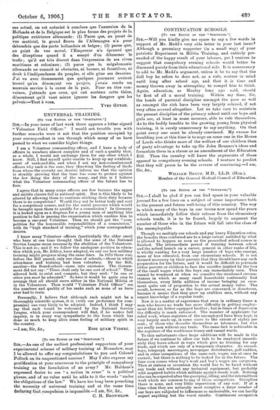SIR, -- In your issue of last week there appears a letter
signed "Volunteer Field Officer." I would not trouble you with further remarks were it not that the position occupied by your correspondent is one through which many of us have passed to what we consider higher things.
am a Volunteer commanding officer, and I have a body of officers in numbers almost complete and of such a quality that, as a whole, I would not exchange them for any other which I kuow. Still, I find myself quite unable to keep up my establish- ment of rank-and-file, and when I ask my non-commissioned officers why such is the case, they (knowing the feeling of thokie from whom the recruits are drawn) inform me that the opinion is steadily growing that the time has come to protest against the few doing the duty of the many, and this is I believe what the Volunteer commanding officer of the future has to face.
I agree that in many corps officers are few because the upper and middle classes fail in national spirit. But is this likely to be altered by allowing them to continue shirking their duty because there is no compulsion ? Would they not be better body and soul for a compulsory course, and for the social pressure which would be brought upon them to qualify for a commission ? In Germany it is looked upon as a disgrace for a young man of anything like position to fail in passing the examination which enables him to become a one-year Volunteer. Then we should get the "com- petition for the honourable responsibilities of a commission," with its "high standard of training," which your correspondent desires.
I know many Volunteer officers (particularly the elder ones) who have at one time thought that the aims of the National Service League mean necessarily the abolition of the Volunteers. This is not so; and if we follow the analogous position in educa- tion which you, Mr. Editor, have adopted, we can see how military training might progress along the same lines. In 1870 there was, before the Bill passed, only one class of schools,—those in which attendance and training had been voluntary. By the Bill, another—the Board-school—came into existence. The :Govern- ment did not say : "There shall only be one sort of school." They allowed -both to exist and compete, but they said : "In one or other you must be educated." So here it would be quite easy to arrange that all should serye either in the National Militia or in the Volunteers. Then would "Volunteer Field Officer" see the numbers and quality of his ranks such as none of us have ever had to train.
Personally, I believe that although such might not be a thoroughly scientific system, it is (with our preference for com- promise) one very likely to he adopted. Indeed, I think I may • say that such would be welcomed by the National Service League, which your correspondent will find, if he makes full inquiry, is in every way sympathetic to the force which has done so much to keep alive some feeling of military spirit in the country.






























































 Previous page
Previous page